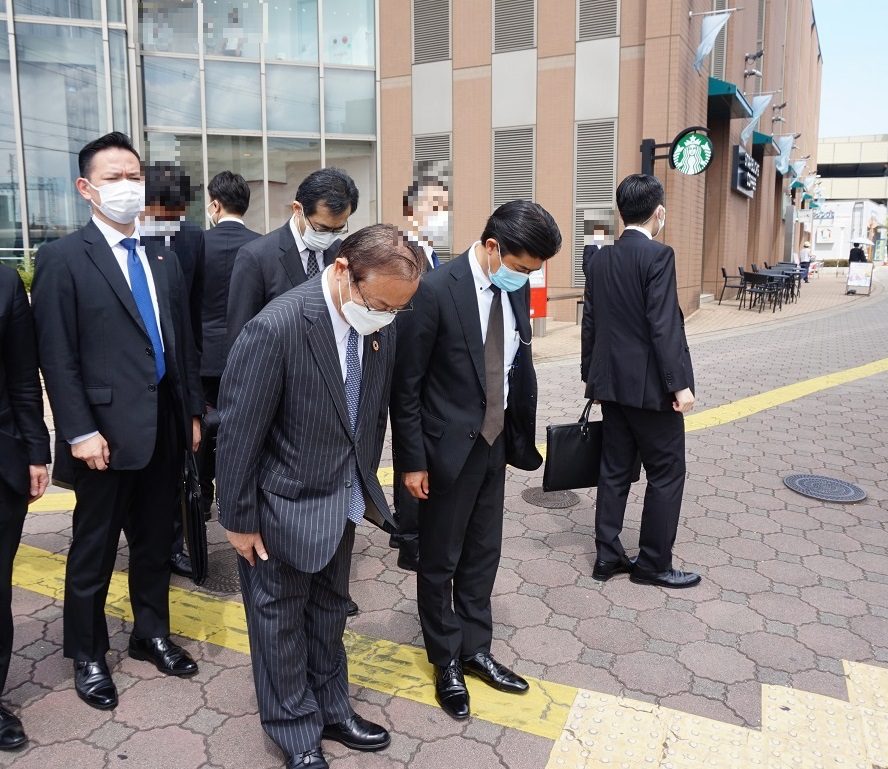Effective communication is at the heart of successful negotiations. This especially holds true when conducting Japanese negotiation, where both cultural and linguistic nuances play a vital role in building relationships and reaching mutually beneficial agreements.
Whether you are a professional or someone that is just starting your career,mastering the right phrases in Japanese negotiation can make a significant difference in business negotiations. In this blog post, we will explore a comprehensive list of negotiation phrases that can elevate your negotiation skills and enhance your success in the Japanese business landscape.
Jump to:
Cultural Context: Key Etiquette Guidelines in Japanese Business Negotiations
Essential Negotiation Phrases in Japanese:
4. Expressing Agreement and Disagreement
6. Responding to Counteroffers
Cultural Context: Key Etiquette Guidelines in Japanese Business Negotiations

Before diving into the specific negotiation phrases, it is important to understand the cultural context in which negotiations take place in Japan. Cultural etiquette forms the foundation of successful Japanese business negotiations. Demonstrating an understanding of these customs shows your commitment to fostering a positive and respectful relationship with your Japanese counterparts.
The Essence of 和 (wa)

Japanese society places great importance on maintaining 和 (wa), which refers to the sense of balance and cooperation. 和 (wa) is a core principle that emphasizes the importance of maintaining harmony, both in interpersonal relationships and group dynamics. In the context of business negotiations, 和 (wa) sets the tone for respectful interactions that promote collaboration rather than competition. Open criticism or rejection can damage relationships, making indirect communication more common.
Hierarchy and Respect for Authority

Hierarchy plays a central role in Japanese society, which is particularly evident in business interactions. Addressing individuals by their appropriate titles and using 敬語 (keigo), the honorific language, is a way of showing respect and acknowledging their position within the hierarchy. For example, using a polite honorific suffix さん (san) after their surname (e.g., 田中さん [Tanaka-san]) is a common and polite way to address someone. Failure to do so can be perceived as a lack of respect for the hierarchical structure.
Silence and Active Listening

In Japanese communication, silence is valued as much as speech. During negotiations, silence is often used as a tool to reflect, deliberate and show respect for the speaker’s words. Active listening is essential, as it indicates your engagement in the conversation. Interrupting or rushing through discussions can be seen as impolite and inconsiderate.
Bow: The Gesture of Respect

Bowing is more than a mere formality in Japan; it is a deeply ingrained expression of respect, gratitude and humility. This nonverbal gesture communicates an individual’s acknowledgment of the other person’s status and is a cornerstone of social interactions.
Initiating the Negotiation Process with a Polite Bow: The first impression sets the tone for any interaction, and in Japanese business culture, this begins with the initial bow. As you enter the room or meet your Japanese counterparts for the first time, a slight and respectful bow is appropriate.
The Subtle Communication in Bowing
In addition to its role as a sign of respect, bowing can convey various meanings and sentiments:
- Gratitude and Apology: A deeper bow generally signifies a higher level of respect or formality, and can express appreciation and gratitude for the opportunity to engage in negotiations. It can also be a nonverbal way to apologize or show regret for any misunderstandings or missteps.
- Hierarchy and Status: The depth of the bow can highlight the hierarchy between individuals. In general, the deeper the bow, the more profound the sentiment being conveyed. A slight inclination of the head may indicate acknowledgment and is often used among friends or acquaintances, while a bow that is deeper and more sustained reflects deeper respect, gratitude or sincerity. A junior employee might bow more deeply to a senior colleague or supervisor as a sign of respect.
- Agreement: A nod while bowing can communicate agreement or alignment with a particular point.
Exchanging Business Cards: 名刺 (meishi)

The exchange of business cards, or 名刺 (meishi) is a ritualistic aspect of Japanese business etiquette and is not just about sharing contact information. It is a demonstration of respect, a way of introducing oneself and an opportunity to establish a connection that could potentially lead to a fruitful business relationship.
When exchanging business cards, follow these steps:
- Present the card with both hands, holding it by the corners and facing them.
- Bow slightly as you offer the card, offering the recipient the text side.
- Receive the other person’s card with both hands and a bow, taking a moment to read and acknowledge the details.
- Place the received card carefully in a cardholder or on the table. Avoid shoving it into a pocket or wallet immediately; this is considered disrespectful.
Essential Negotiation Phrases in Japanese:
1. Opening the Negotiation

When initiating a negotiation, it is important to establish good connection and show respect. Start with these phrases to set the tone for constructive discussions:
はじめまして、田中と申します
Hajimemashite, Tanaka to moushimasu
Nice to meet you, I am Tanaka.
ご多忙中とは存じますが
Go-tabouchuu to wa zonjimasu ga
I understand you’re busy, but…
今日はお時間を割いていただき、ありがとうございます
Kyou wa ojikan o saite itadaki, arigatou gozaimasu.
Thank you for taking the time to meet with me today.
Here’s an example on how we can use the phrases:
はじめまして、A会社、営業部の田中と申します。本日は、お忙しいところ、お時間を割いていただき、ありがとうございます。
Hajimemashite, A kaisha, eigyoubu no Tanaka to moushimasu. Honjitsu wa oisogashii tokoro, ojikan o saite itadaki, arigatou gozaimasu.
Nice to meet you, I’m Tanaka from the sales department at A Corporation. I understand your busy schedule, but thank you for taking the time to meet with me today.
This polite introduction sets the stage for a positive negotiation atmosphere by expressing respect and courtesy. Mention your position and express your eagerness to engage in the negotiation.
2. Presenting Your Proposal

Clearly expressing your proposal is crucial. Use these phrases to outline your terms and intentions:
私どもがご提案したいのは…
Watashidomo ga goteian shitai no wa…
Our proposal is…
この条件で合意していただけますか?
Kono jouken de gouishite itadakemasu ka?
Can we agree on these terms?
こちらが本件の最重要事項です
Kochira ga honken no saijyuuyoujikou desu.
Here are the key points of our proposal.
この提案により、双方に利益が得られると確信しております
Kono teian ni yori, souhou ni rieki ga erareru to kakushin shiteorimasu.
We are confident that this proposal will result in mutual benefits.
How to use it:

新製品の共同開発をご提案したく存じます。
Shinseihin no kyoudou kaihatsu o goteian shitaku zonjimasu.
Our proposal is to collaborate on the development of a new product.
この条件で合意していただけますか?もしご質問および、ご提案があれば、遠慮なくお知らせください。
Kono jouken de gouishite itadakemasu ka? Moshi goshitsumon oyobi goteian ga areba, enryo naku oshirase kudasai.
Can we agree on these terms? If you have any questions or suggestions, please feel free to let us know.
こちらが本件の最重要事項です。私どもは、自信を持って、高品質の製品を、競争力のある価格設定で、提供できるかと存じます。
Kochira ga honken no saijyuuyoujikou desu. Watakushidomo wa jishin o motte, kouhinshitsu no seihin o kyoushouryoku no aru kakaku settei de teikyou dekiru ka to zonjimasu.
Here are the key points of our proposal. We are confident in providing high-quality products at competitive prices.
3. Seeking Clarification

When parts of the proposal are unclear, use these phrases to ask for additional information:
もう少し説明していただけると助かります
Mou sukoshi setsumei shite itadakeru to tasukarimasu
It would be helpful if you could explain a bit more.
もう少し詳細をお聞きしたいです
Mou sukoshi shousai o okiki shitai desu
I would like to ask for more details.
お伺いしたいことがあるんですが
Oukagai shitai koto ga arun desu ga
There’s something I’d like to inquire about.
4. Expressing Agreement and Disagreement

Conveying agreement or disagreement tactfully is crucial.
それは素晴らしいご提案だと思います
Sore wa subarashii goteian da to omoimasu
I think that’s a great proposal.
同感です
Dōkan desu
I agree.
それは難しいかもしれません
Sore wa muzukashii kamoshiremasen
That might be difficult.
申し訳ありませんが、別のアプローチを考えてみたいと思います
Mōshiwake arimasen ga, betsu no apurōchi o kangaetemitai to omoimasu
I’m sorry, but I’d like to consider a different approach.
How to use it in the negotiation:

Person A: 生産効率を向上させるために新しいプロセスを導入することを検討してはどうかと思っています。
Person B: それは素晴らしい提案だと思います。
Person C: 同感です。
Person A: Seisan kōritsu o kōjō saseru tame ni atarashī purosesu o dōnyū suru koto o kentō shitewadouka to omotte imasu.
Person B: Sore wa subarashii teian da to omoimasu.
Person C: Dōkan desu.
Person A: We’re considering implementing a new process to improve production efficiency.
Person B: I think that’s a great proposal.
Person C: I agree.
Person A: 今回の提案は来月の予算内で実行可能です。
Person B: それは難しいかもしれませんね。 申し訳ありませんが、別のアプローチを考えてみたいと思います。
Person A: Konkai no teian wa raigetsu no yosan-nai de jikkō kanō desu.
Person B: Sore wa muzukashii kamoshiremasen ne. Mōshiwake arimasen ga, betsu no apurōchi o kangaetemitai to omoimasu.
Person A: This proposal is feasible within next month’s budget.
Person B: That might be difficult. I’m sorry, but I’d like to consider a different approach.
5. Making Counter offers

Counteroffers play a crucial role in negotiations, allowing you to propose alternative terms while maintaining a constructive atmosphere. Here are some phrases to propose alternatives:
もし可能であれば、以下の条件で…
Moshi kanou de areba, ika no jouken de…
If possible, under the following conditions…
少し条件を変えてみることはできませんか?
Sukoshi jouken o kaete miru koto wa dekimasen ka?
Would it be possible to consider changing the terms slightly?
もう少し条件を話し合えればと思います
Mou sukoshi jouken o hanashiaereba to omoimasu
I would like to discuss the conditions a bit more.
その点について協議させてください
Sono ten ni tsuite kyougisasete kudasai
Please let’s discuss that point.
妥協案を考えてみましょう
Dakyou-an o kangaete mimashou
Let’s consider a compromise.
条件を調整する余地はありますか?
Jouken o chousei suru yochi wa arimasu ka?
Is there room for adjusting the conditions?
Example in how to use it:

もし可能であれば、価格を少し下げた条件でお願いできますか?
Moshi kanou de areba, kakaku o sukoshi sageta jouken de onegai dekimasu ka?
If possible, could we discuss the possibility of a slightly lower price?
少し条件を変えてみることはできませんか?支払いスケジュールを調整していただけると助かります。
Sukoshi jouken o kaete miru koto wa dekimasen ka? Shiharai sukejuru o chousei shite itadakeru to tasukarimasu.
Would it be possible to consider changing the terms slightly? Adjusting the payment schedule would be greatly appreciated.
妥協案を考えてみましょう。お互いが納得できるような解決策を見つけたいです。
Dakyou-an o kangaete mimashou. Otagai ga nattoku dekiru you na kaiketsusaku o mitsuketai desu.
Let’s consider a compromise. I’d like to find a solution that both parties can agree on.
条件を調整する余地はありますか?価格の面で少し柔軟性を持てると助かります。
Jouken o chousei suru yochi wa arimasu ka? Kakaku no men de sukoshi juunansei o moteru to tasukarimasu.
Is there room for adjusting the conditions? It would be helpful if there could be a bit of flexibility in terms of pricing.
6. Responding to Counter Offers

Responding to counter offers in Japanese negotiations requires a balance between showing appreciation and indicating your commitment to reaching a mutually beneficial agreement. Use these phrases and adapt them to specific contexts to foster a positive atmosphere and navigate negotiations respectfully:
それは魅力的な提案ですね
Sore wa miryokuteki na teian desu ne
That’s an attractive proposal.
少し考えさせていただけますか
Sukoshi kangaesasete itadakemasu ka
May I have some time to think about it?
提案について再度協議してみましょう
Teian ni tsuite saido kyougi shite mimashou
Let’s discuss the proposal again.
提案を検討させていただきます
Teian o kentou sasete itadakimasu
We will consider the proposal
最善の解決策を見つけたいと思います
Saizen no kaiketsu-saku o mitsuketai to omoimasu
I would like to find the best solution.
How to apply in the conversation:

それは魅力的な提案ですね。しっかりと検討させていただきます。
Sore wa miryokuteki na teian desu ne. Shikkari to kentou sasete itadakimasu.
That’s an attractive proposal. We will carefully consider it.
少し考えさせていただけますか。条件を再評価するために必要があります。
Sukoshi kangaesasete itadakemasu ka. Jouken o saihyouka suru tame ni hitsuyou ga arimasu.
May I have some time to think about it? It’s necessary for us to reevaluate the terms.
提案について再度協議してみましょう。最適な解決策を見つけたいですね。
Teian ni tsuite saido kyougi shite mimashou. Saiteki na kaiketsu-saku o mitsuketai desu ne.
Let’s discuss the proposal again. We want to find the best solution.
7. Closing the Negotiation

Concluding negotiations smoothly is essential. Here are some phrases to summarize and finalize the agreement:
それでは、こちらの提案に合意ということでよろしいでしょうか?
Sore dewa, kochira no teian ni goui to iu koto de yoroshii deshou ka?
So, are we in agreement with this proposal?
この条件で合意できたことを嬉しく思います
Kono jouken de goui dekita koto o ureshiku omoimasu
I am pleased that we have come to an agreement under these terms.
今後の連絡についてはどのように進めましょうか?
Kongo no renraku ni tsuite wa dono you ni susumemashou ka?
How should we proceed with communication from here?
有益なご意見を賜り、大変感謝しております。
Yuueki na goiken o tamawari, taihen kansha shiteorimasu
We deeply appreciate your valuable insights.
How to use it:

Person A: それでは、こちらの提案に合意ということでよろしいでしょうか?
Person B: はい、結構です。条件にも同意いたします。
Person A: Soredewa, kochira no teian ni goui to iu koto de yoroshii deshou ka?
Person B: Hai, kekkou desu. Jouken ni mo doui itashimasu.
Person A: So, are we in agreement with this proposal?
Person B: Yes, I accept the proposal. I agree to the terms.
Person A: この条件で合意できたことを嬉しく思います。
Person B: お互いに良い関係を築いていけるといいです。
Person A: Kono jouken de goui dekita koto o ureshiku omoimasu.
Person B: Otagai ni yoi kankei o kizuiteikeru to ii desu.
Person A: I am pleased that we have come to an agreement under these terms.
Person B: I believe we can build a positive relationship moving forward.
Person A: 今後の連絡についてはどのように進めましょうか?
Person B: メールで進捗を共有し、定期的に連絡を取り合いましょう。有益なご意見を賜り、大変感謝しております。
Person A: Kongo no renraku ni tsuite wa donoyouni susumemashou ka?
Person B: Meeru de shinchoku o kyouyuu shi, teikiteki ni renraku o toriai mashou. Yuueki na goiken o tamawari, taihen kansha shiteorimasu.
Person A: How should we proceed with communication from here?
Person B: Let’s share progress via email and keep in touch regularly. We are truly grateful for the productive discussion.
Conclusion

Mastering negotiation phrases in Japanese is more than just learning words – it is about understanding the cultural nuances that underlie effective communication. The phrases mentioned above will help you navigate the world of Japanese business negotiations, allowing you to foster successful partnerships and achieve mutually beneficial outcomes.
If you are looking to further enhance your language skills, consider exploring our business Japanese courses to master the art of effective communication in the business world.
For more insights into Japanese business practices and etiquette, don’t miss our other informative blog posts.
Frequently Asked Questions (FAQs)
1. What is the significance of using honorifics in Japanese business negotiations?
Honorifics are crucial in Japanese negotiations as they reflect respect and hierarchy. Japanese business culture places great emphasis on proper titles and polite language, and using appropriate honorifics demonstrates your understanding of the culture and your willingness to establish a harmonious relationship.
2. How can I express disagreement politely during negotiations?
Rather than openly disagreeing, you can use phrases such as
少し懸念があります
Sukoshi kenen ga arimasu ga
I have some concerns
This approach conveys your reservations without causing conflict.
3. Can I negotiate assertively in Japanese business culture?
While assertiveness is valued in certain contexts, it is important to balance it with respect and sensitivity to cultural norms. Direct and forceful negotiation styles may be seen as confrontational.
4. How do I show gratitude at the end of successful negotiations?
Express gratitude by saying
お取引をいただき、ありがとうございます
O torihiki o itadaki, arigatou gozaimasu
Thank you for the business deal.
5. How can I politely decline a proposal?
You can use phrases such as
申し訳ありませんが、今回は見送らせていただきたいと思います
Moushiwake arimasen ga, konkai wa miokurasete itadakitai to omoimasu
I’m sorry, but I would like to pass on this opportunity for now to decline respectfully
